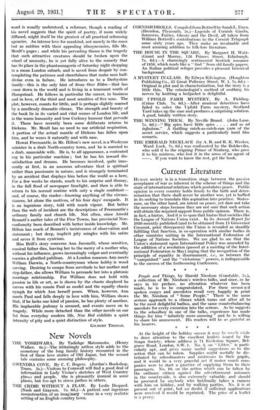Current Literature HUMAN society is in a transition stage between
the passive acceptance of war as inherent in the scheme of things and the state of international relations which postulates peace. Public opinion in every country holds firmly to the faith and deter- mination that there shall never be another war, yet is baffled in its seeking to translate this aspiration into practice. States- men, on the other hand, are intent on peace, yet dare not take the necessary steps because they are not sure that such action will obtain the required support from public opinion. There is, in fact, a hiatus. And it is to span that hiatus that societies like the League of Nations Union exist. In its Annual Report for 1930 recently published (and to be obtained from 15 Grosvenor Crescent, price threepence) the Union is revealed as steadily fulfilling that function, in co-operation with similar bodies in other countries uniting in the International Federation of League of Nations Societies. We are glad to see that the Union's statement upon International Policy was amended by the addition of a resolution (passed at a meeting of the Inter- national Federation in May) urging that the recognition of the principle of equality in disarmament, i.e., as between the "vanquished" and the "victorious" powers, is indispensable to the success of the forthcoming Conference.


























 Previous page
Previous page